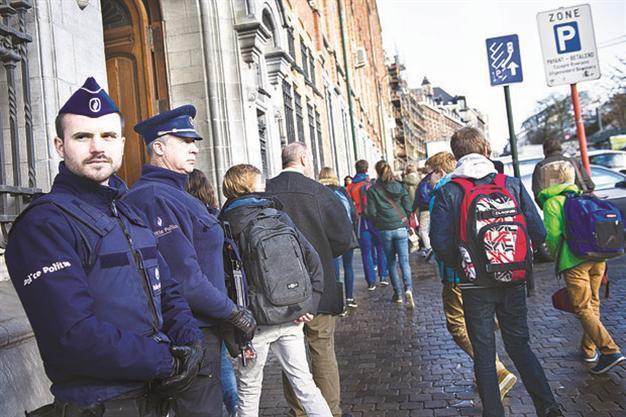Brussels schools and metro reopen despite terror alert
BRUSSELS - Agence France-Presse

AFP photo
Brussels struggled to return to normal on Nov. 25 after four days on maximum terror alert, with schools and the metro reopening despite suspects from the Paris attacks still being at large.Troops and police were still patrolling the streets of the Belgian capital and the alert status remained at the highest possible level of four on Nov. 24, as schools and metro opened though leading to questions about what had changed since schools had closed on Nov. 23.
“It’s not very reassuring, is it?” said Sarah, who runs a private nursery in Brussels. “If it wasn’t safe to open on Monday and Tuesday, why is it now?”
The Brussels metro system had been closed since Nov. 21 and gradually returned to service, but with many stops still shut to better deploy security staff.
About 300 extra police from other cities in Belgium were sent to Brussels to guard schools and 200 extra soldiers helped patrol the metro.
Public museums, concert halls and cinemas complexes also returned to normal.
Hospitals were also put on a special alert, with Belgian officials worried attackers could specifically target emergency rooms and ambulances.
Belgian Prime Minister Charles Michel on Nov. 23 extended the maximum threat level by at least a week, but took the decision to reopen the schools on Nov. 25.
Belgium on Nov. 24 issued an international arrest warrant for a “dangerous” man, Mohamed Abrini, who was seen driving a car with key Paris attacks suspect Salah Abdeslam. Abdeslam is also at large.
The police on Nov. 24 also charged a fifth suspect in connection with the Paris attacks.
A day before Belgium started to return to normal, France and the United States pledged to step up the fight against the Islamic State of Iraq and the Levant (ISIL), urging Russia to throw its weight behind global efforts to resolve the four-year Syrian conflict.
Speaking 11 days after jihadists killed 130 people in the French capital, President Francois Hollande, who met with his U.S. counterpart Barack Obama at the White House on Nov. 24, urged an “implacable” joint response to crush ISIL in Syria and Iraq.
At a joint press conference, Obama pledged America’s full solidarity in the wake of carnage, switching into Hollande’s language to tell him, “We are all French.”
While announcing no specific new action, Hollande said he and Obama agreed to “scale up our strikes both in Syria and in Iraq to broaden our scope to strengthen our intelligence sharing regarding the targets.”
Both leaders said they would boost support for forces battling ISIL on the ground, while continuing to rule out any ground campaign.
“France will not intervene militarily on the ground,” Hollande said.
Washington and Paris have both stepped up their fight against ISIL in Syria, with France launching its first strikes from the Charles de Gaulle aircraft carrier in the Mediterranean and the U.S. calling for more international cooperation against the jihadists.
Illustrating the leaders’ message on tighter cooperation, France said its warplanes had hit an ISIL command center near its key western Iraqi stronghold of Mosul, in a strike led with the U.S. Air Force.
















